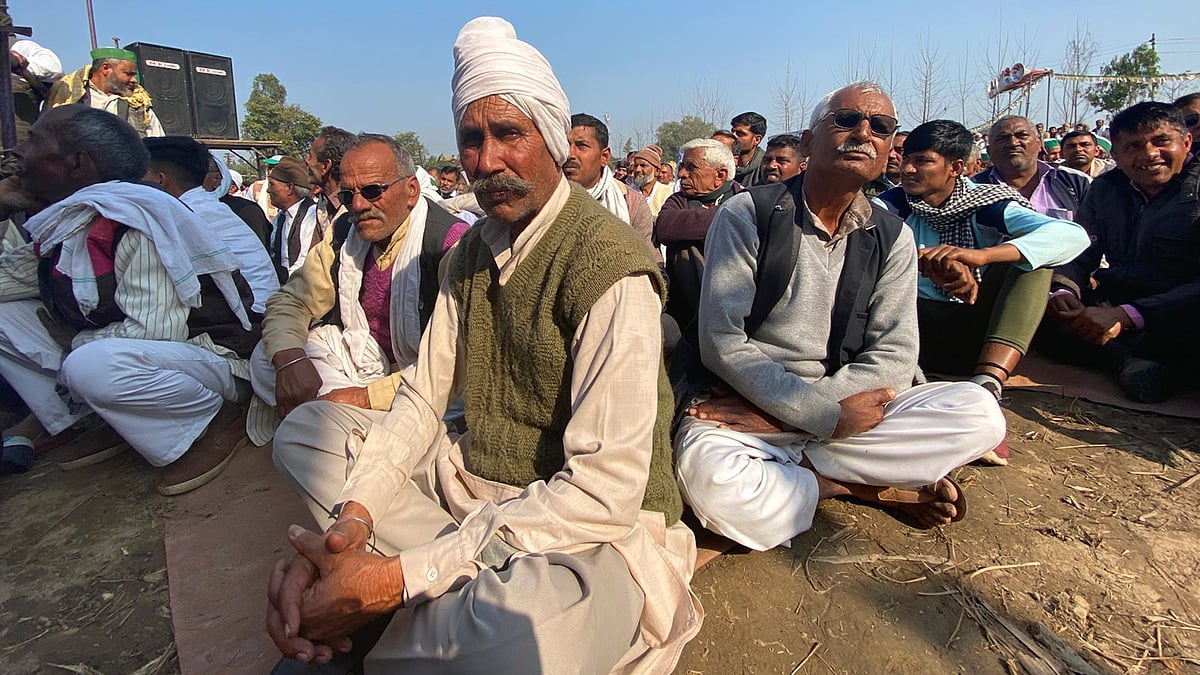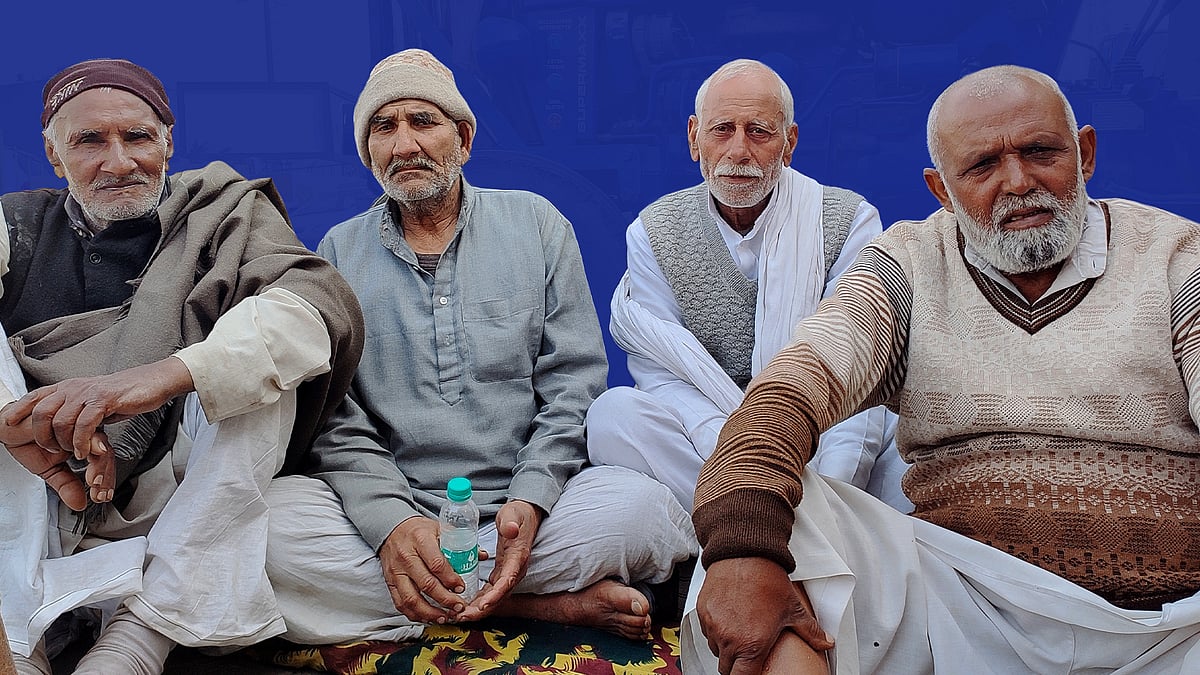Why Saini farmers in Uttar Pradesh aren’t supporting farmer protests
Loyalty to the BJP and popularity of Republic Bharat has made the Sainis turn their backs on the movement led by Jats who claim to have support across caste groups.
On February 1, Balbir Singh, 65, travelled to the ITI ground in Uttar Pradesh’s Bijnor to participate in a mahapanchayat against the new farm laws passed by the Narendra Modi government. According to news reports, the gathering had more than 15,000 farmers who extended their support to the farmer protests.
But Balbir was not impressed. “The Jats were bossing everyone. One said we’ll do this, another said we’ll do that,” the vegetable farmer from the Saini caste told Newslaundry. “I did not understand much.”
A resident of Ram Bagh in Bijnor, Balbir owns about four hectares of land on which he grows sugarcane and vegetables like carrot, radish, bottle gourd, and ridge gourd.
The farmer protests in western UP are led by the Bharatiya Kisan Union, which claims that it has the support of farmers and workers from across caste lines. “This protest is a union of all castes,” BKU spokesperson Rakesh Tikait told a gathering in Haryana last week.
But in western UP, this is not quite true. Saini farmers who, like the Jats, suffer the consequences of agrarian distress, are wary of the movement because of their loyalty to the Bharatiya Janata Party. They’re also irked by the overwhelming representation of the Jats and the media coverage of the protests on Hindi news channels.
Parmesh Singh, Balbir’s son, said he knows of at least four Jats from his village who joined the protest in Ghazipur on the Delhi-UP border. But he and his father aren’t too keen.


“These protests can be attended by those who have labourers to tend to their farms,” Balbir said. “We don’t own much land and nor do we employ labourers. If we go to protests, who will look after the crops?”
As I ventured another question, the busy old man directed me to his son. He had to head to his farm, he said. Parmesh, 31, picked up where his father had left off.
“The vegetables we grow are water sensitive,” he explained. “You have to check on them from time to time. Our farming is different from Jats, who switch on the tube well for their sugarcane crops for hours. Moreover, we grow a lot of the vegetables for our own subsistence, and only a portion of it is sold in the local markets.”
Jagdish Saini, 39, a resident of Bijnor’s Kajipada, said the farmer protests in UP are a movement “led by those who grow sugarcane”. Ironically, Jagdish too is a sugarcane farmer with five hectares of land. A tractor cart full of the crop is parked outside his house.
“It has now become a political movement against the BJP, with the Left, Congress and the Rashtriya Lok Dal coming together,” Jagdish said. “If it was a genuine movement, we would have taken part in it.”
For most of our conversation, Jagdish sermonised against the protests, its alleged Khalistani connections, and how pop singer Rihanna and former adult star Mia Khalifa were paid to tweet in support of the agitation.
On the Khalistan point, I inquired about his source. “I saw it on Republic Bharat. Wait a minute, I made a video of it,” he said, glaring into his phone. “I record these segments so that I can prove it when I talk to others.” I watched Jagdish’s shoddy recording of a primetime show on the channel for a few seconds and then put it down, much to his disappointment.
“Even this Deep Sidhu is a Khalistani,” he ranted, referring to the actor-turned-activist who is under arrest for his role in the Republic Day violence in Delhi. “Now these agitators say he was with the BJP. Before that, they said he was with them, but then Sidhu was all pure and innocent.”


Regardless of Jagdish’s tirades, the farmer protests in western UP do have a political angle. At the mahapanchayat in Muzaffarnagar on January 29, the gathering took an oath to boycott the governing BJP. But farmers from the Saini caste in the region – part of the Other Backward Classes grouping – disassociate themselves from the protests; instead, they express unequivocal support for the saffron party.
“The farmers who are protesting say they are fighting for the minimum support price. But they never took up the MSP issue for those who grow vegetables,” Jagdish said. “The protest is not divided along the lines of big and small farmers. It is a protest only of Jats and Sikhs.”
According to Ravi Kumar, Jagdish’s neighbour and a farmer from the Saini caste, Bijnor does not have a mandi samiti, a body that runs local wholesale vegetable and fruit markets. “The Tikait brothers, Naresh and Rakesh, never raised any of the issues of those who grow vegetables here. No one spoke for us,” he said.
Jagdish and Ravi believe that the new farm laws will be good for business: they will remove middlemen embedded within the vegetable business of small farmers.
“The middlemen here charge six percent for every transaction,” Ravi explained. “The law will discard these middlemen and we will get better pay for what we sell. Usually, middlemen buy our cauliflower at Rs 5 a kg, which retailers then sell for Rs 20 a kg. If our produce goes straight to the retailers, we will make a few more rupees.”
Ravi picked up his phone and played an audio clip he found on Facebook. It’s a purported recording of a Jat youth confessing to attending the Ghazipur protest in exchange for money and entertainment. “You take the money away and the Jats will return like this,” Ravi grinned, snapping his fingers.
In Muzaffarnagar’s Kutesra village, Roshan Lal, 81, a Saini farmer with 17 hectares of land, said his community is not supporting the farmer protests. Roshan owns more land than most Jat farmers I met and, like them, grows sugarcane.
“I am with the BJP no matter what,” he said. “I can’t speak about the laws, which seem to have really spooked the Jats, but they now oppose the BJP, and we will not do that.”



Roshan conceded that the rate of sugarcane in the state has not increased under the Adityanath government, but a stronger glue binds him to the saffron party. “All the political leaders of our caste are in the BJP – be it Vikram Singh in Kawal or Dharam Singh in Saharanpur,” he said. “Moreover, crime in UP has been curbed under Yogi Adityanath.”
Roshan's neighbour, 35-year-old Vineet Saini, also a sugarcane farmer, admitted early in our conversation that he did not know what the farm laws were about. Whatever news coverage that he had seen on the Hindi news channel Republic Bharat informed him that they did not entail any loss to him.
For one, Vineet does not face a problem that most Jats do: the late payment of dues by sugar mills in the region. “Yes, the sugarcane rates have not increased, but the nearby mill in Deoband has been paying us on time for the produce,” he said. “The protests are happening simply because there is an election coming up in the state. But when the time comes, even the Jats will vote for the BJP.”
Vineet’s family has been a long-time supporter of the party. His father and grandfather voted for it since the Advani-Vajpayee years, crucially because of the Ramjanmabhoomi movement in the late 1980s and early 90s. Asked about this allegiance, Saini echoed what Bijnor’s Parmesh Singh told me about the community’s immunity to the growing anti-BJP chorus: “Why would we boycott the BJP? It is the only Hindu party out there.”
There are also Saini farmers whose sympathy for the ongoing protests comes with multiple caveats. Jaipal Singh, 65, a Saini farmer on the outskirts of Shamli, said that sugarcane farming is no longer a profitable business in his region. “We can’t pay our grandchildren’s school fees or our home loan,” he said. “Cows have ravaged our produce. They eat our wheat crops because the local gaushalas let them out at night.”
When the BKU organised a mahapanchayat in Shamli, Jaipal went so far as to donate money for the protests. But he shuns the claim that all communities are in support of it. “It is mere lip service to say that all 36 castes support it when only Jats are involved,” he said.
Jaipal’s reluctance to participate in the agitation stems from its anti-BJP thrust. He said he had voted for the party since its inception and will continue to do so “even if they do not do any work,” adding that he trusted Prime Minister Modi when he told the parliament on Monday that “there was MSP, there is MSP, and there will be MSP”.
Jaipal said: “Modi might have made many mistakes, but he did one thing right: if he had not controlled the Covid pandemic like he did, not only India, but the world would have been wrecked.”
I asked him how he was so sure of this. “I watched it on Republic Bharat,” he shot back. “We watch it every morning and evening.”
 ‘We are paying for the mistake of voting BJP’: West UP mahapanchayats seek to turn the political tide
‘We are paying for the mistake of voting BJP’: West UP mahapanchayats seek to turn the political tide ‘Voting for BJP is our generation's biggest regret’: A day with Jat farmers at Ghazipur
‘Voting for BJP is our generation's biggest regret’: A day with Jat farmers at Ghazipur